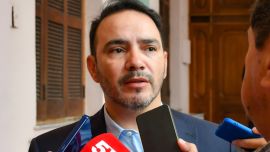Former foreign minister Héctor Timerman, who is being treated for cancer, was released from house arrest Wednesday.
The prosecution had previously rejected his request for release, but substitute Federal Judge Sergio Torres granted his release "on humanitarian grounds," the agency said.
The move comes almost immediately Timerman was turned away from the check-in service at Ezeiza airport and prevented from boarding an American Airlines flight to the United States late Tuesday after his visa was rejected.
Timerman – a member of ex-president Cristina Fernández de Kirchner's government from 2010-2015 – was placed under house arrest in December, accused of covering up Iranian involvement in the 1994 AMIA Jewish community centre bombing.
The 64-year-old former minister had obtained a permit from the Justice Ministry to travel to New York for treatment for cancer, which has confined him to a wheelchair. But according to local press reports, when his visa was checked at Buenos Aires' Ezeiza airport late Tuesday he was prevented from boarding the flight.
According to local reports, Torres granted Timerman this benefit as “an exception” due to “humanitarian reasons.”
Timerman must present himself before the courts upon his return to Argentina.
Anger
Kirchnerite and other opposition lawmakers reacted angrily to the incident. "Timerman cannot enter the United States because his visa was revoked because of the preventive detention," Agustín Rossi wrote on Twitter.
Rossi said Claudio Bonadio, the judge prosecuting Timerman, Kirchner and others for the alleged cover-up, was responsible.
Timerman was sentenced to house arrest rather than jail because of his fragile health.
Fernández de Kirchner enjoys parliamentary immunity from preventive detention through her Senate seat.
"I have asked to be judged as quickly as possible. Preventing me from getting timely medical attention is like condemning me to death," Timerman wrote in an op-ed in The New York Times on December 20, in which he described himself as a "political prisoner."
"Argentina's Constitution does not permit the death penalty. But with a judge like this, that is little guarantee."
Bonadio believes Timerman, Fernández de Kirchner and others covered up alleged Iranian involvement in the bombing by pushing for the signing of a pact with Iran, under which suspects could be questioned in Iran and not brought to Argentina.
The plan was formally approved by both houses of the Argentine Congress, but never ratified by Iran.
Nobody has been tried for the bombing, which killed 85 people.
Timerman, a former ambassador to the US, lived for more than a decade in the United States where one of his daughters was born.
- TIMES/AFP

























Comments